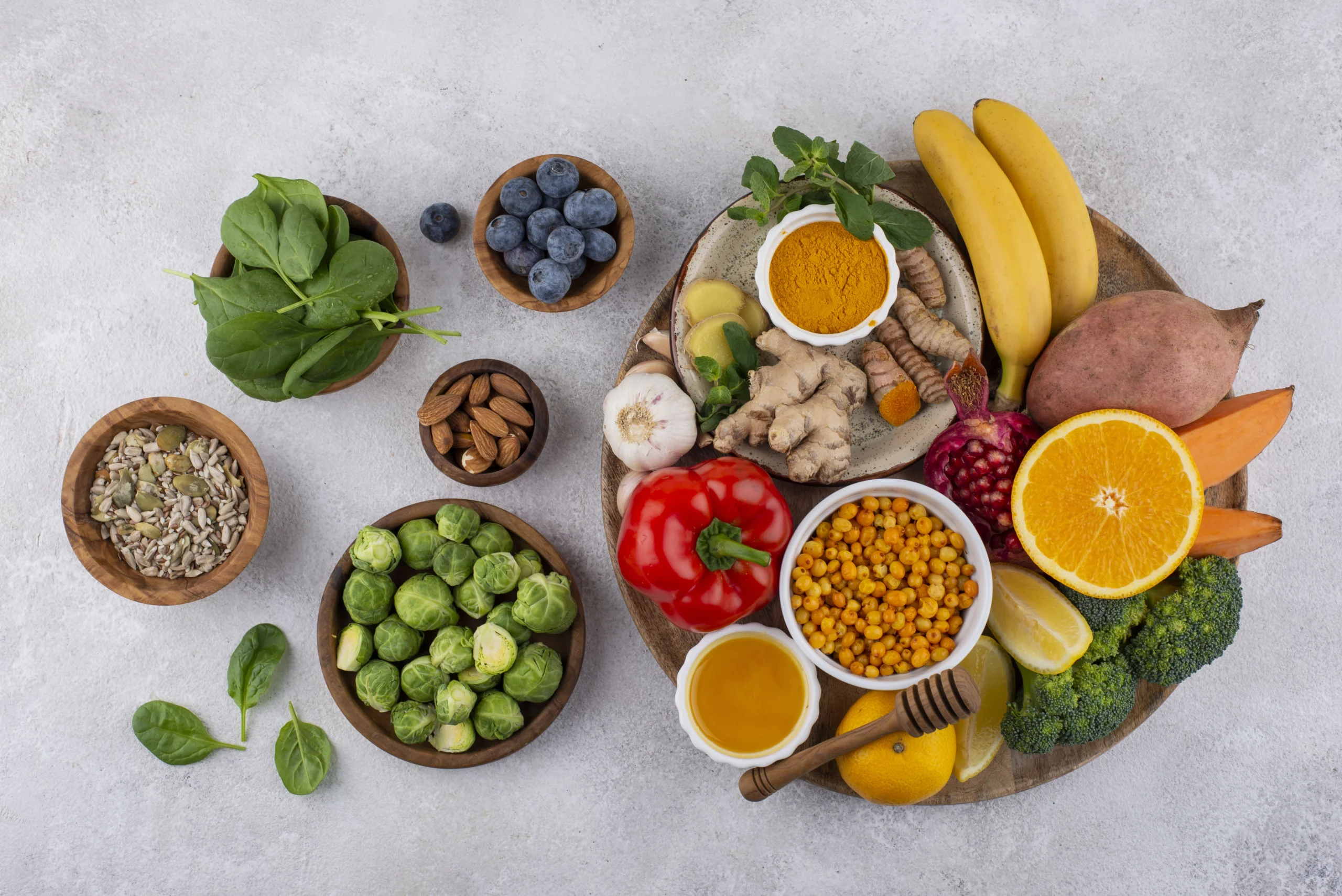Certain foods can cause inflammation in the body, while others can help reduce it.
Before we talk about the list of vegan anti-inflammatory foods that can help with inflammation, let’s understand what inflammation is and why it’s important for your health.
Now, let’s explore 10 simple and tasty vegan foods that can help calm down this inflammation:
vegan anti-inflammatory foods
Leafy Greens
Dark leafy greens such as kale, spinach, and Swiss chard are rich in nutrients and antioxidants. Including these greens in your diet improves overall health, speeds up healing, and assists in injury recovery thanks to their abundant vitamin C content. Research indicates that eating green leafy plant foods rich in phylloquinone may help slow down cognitive decline as we age.
Consuming them raw provides an extra dose of vitamin C ( powerful natural antioxidant ) which supports skin health and muscle function. This antioxidant strengthens the immune system, reduces inflammation, and facilitates iron absorption. The darker the greens, the more effective they are in fighting diseases like heart disease and cancer.
Berries
Nuts and Seeds
Nuts and seeds, as plant foods, play a key role in an anti-inflammatory diet. They’re loaded with nutrients like healthy fats, protein, fiber, and vitamins B6 and E. Despite having more omega-6 fats, they also contain monounsaturated fats and other compounds that aid in reducing inflammation in the body.
Studies show that nuts like almonds, cashews, and pistachios, with their monounsaturated fats, have anti-inflammatory effects, and it’s best to eat them with the skin on to retain the antioxidants for maximum benefit. Walnuts have more antioxidants than fish and can balance the omega-6 to omega-3 ratio, which is important for controlling inflammation levels in the body.(5),(6)
Turmeric
Adding turmeric to foods can be beneficial for managing inflammation due to its compound curcumin, which fights harmful molecules (antioxidant) and reduces swelling (anti-inflammatory). Curcumin, found in turmeric, can help with joint pain and multiple sclerosis by blocking inflammation pathways, especially those triggered by TNF-α.(8)
But curcumin isn’t well absorbed by the body alone. Mixing turmeric with black pepper, which contains piperine, can improve absorption and effectiveness. This combo might also ease muscle soreness and speed up recovery after exercise. Even a little turmeric can boost overall health, whether you’re generally healthy or not.
Turmeric is commonly used in Indian cuisine, but people often enjoy it in the form of tea or with vegan milk. However, Kelly has shared a variety of recipes featuring turmeric, showcasing its versatility and diversity in culinary applications.
Avocado
Avocados, originating from the Americas, are packed with essential vitamins and plant compounds such as carotenoids and phenolic compounds. These compounds are known to bolster the immune system and alleviate inflammation. Their antioxidant properties are particularly advantageous for brain health, as they combat oxidative stress associated with Alzheimer’s and Parkinson’s diseases. (9)
Broccoli
Eating broccoli is good for you! It’s loaded with vitamin C and flavonoids like Quercetin, which work as antioxidants, fighting off harmful free radicals.
Also broccoli has carotenoids that protect your skin cells and glucosinolates that turn into sulforaphane, a strong fighter against sickness. Research shows that sulforaphane, produced from glucosinolates in broccoli as a defense mechanism, helps prevent cancer. it may also have additional benefits such as reducing blood pressure and protecting the heart.
Ginger
Ginger, renowned for its flavorful rhizome root, has been a staple in cooking and traditional medicine across Asia for centuries. Its abundance of antioxidants allows ginger to effectively combat inflammation within the body. This quality not only helps in calming upset stomachs but also in relieving symptoms associated with colds and flu.( 11)
Beans and Legumes
Whole Grains
Grains, hard edible seeds from cereal plants, are vital plant foods in many Asian countries. They are essential for a healthy diet as they provide vital nutrients like fiber and B vitamins. Opting for whole grains over refined options can lower the risk of diabetes, heart disease, and high blood pressure, according to research that shows a 47% decrease in heart disease risk with higher whole grain consumption. Choosing whole grains is a simple way to promote overall health.
Green Tea
Green tea, made from the Camellia sinensis plant, is popular worldwide for its higher natural polyphenol content and health benefits compared to black tea. It’s packed with antioxidants that protect cells, support overall health, reduce inflammation and heart disease.
Polyphenols in green tea can prevent cancer and other diseases by acting as antioxidants, protecting cells from damage. They also help balance oxidative stress by boosting the body’s own antioxidant enzymes. The most abundant polyphenol in green tea, EGCG, is thought to be responsible for its cancer-preventive effects.(14)
Frequently asked question on plant foods

Leave a Reply